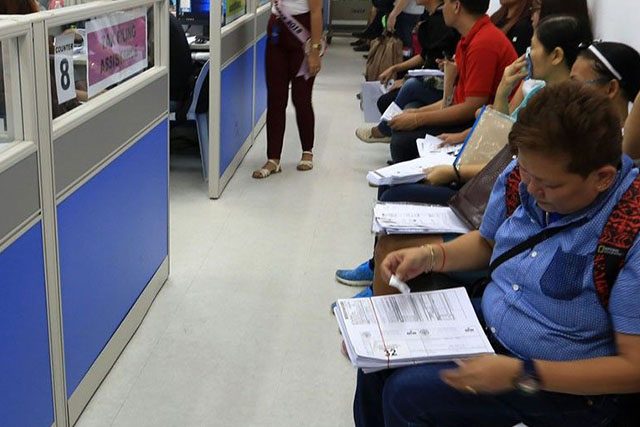Some government employees in offices would have unpleasant dispositions when dealing with clients despite supposedly having comfortable working conditions.
Twitter user @phillipnandez shared that he noticed some workers are impolite or “rude” to Filipinos who conduct transactions at government offices.
“Not generalizing but the audacity of some government employees! Hello nakaupo kayo, naka-aircon, maayos ang sweldo, ang laki ng bonus, tapos ang babastos ninyo makipag-usap,” he wrote.
“Nahiya naman ang mga konduktor ng jeep na naka-babad sa araw na (ang lalaki) ng mga ngiti habang nag-wo-work,” the user continued.
Not generalizing but the audacity of SOME government employees! HELLO NAKA UPO KAYO, NAKA AIRCON, MAAYOS ANG SWELDO, ANG LAKI NG BONUS TAPOS ANG BABASTOS NINYO MAKIPAG USAP. NAHIYA NAMAN ANG MGA KONDUKTOR NG JEEP NA NAKA BABAD SA ARAW NA ANLALAKI NG MGA NGITI HABANG NAG WOWORK🙄
— Davao Conyo👨🏻💻 (@phillipnandez) January 2, 2020
Other Twitter users agreed with his observation and even shared some of their own experiences.
Twitter user @yanihatesu shared that a government employee, who was supposedly three hours late, was shrewish to her and her companions during an interview for a state-sponsored scholarship.
“‘Di ko makakalimutan yung nag-i-interview para sa scholarship para sa Pasig dati. Ang dami kong kasama na umuwi na dahil 3 hours siyang (the employee) late, and she’s not even apologetic about it. Ang taray talaga niya makipag-usap?” she wrote.
Another user replied to the original post and shared, “This is so true. Lalo na if dami mong questions, like ‘di ko naman talaga alam ano ‘yung tamang steps, kaya nga nagtatanong eh. Kung mali-mali ka naman, ‘yung iba tatarayan ka,” wrote @khlaireabegail.
RELATED: How hard is it to get information from government, anyway?
There were other Filipinos who revealed that not all government employees are entitled to bonuses and are considered regular in their positions.
“Hi, as a gov’t employee na ‘di regular kahit 5 years na sa trabaho, laging delayed ang sahod, walang OT (overtime) pay kahit lagi naka-OT, ‘yung ‘bonus’ depende lang sa nakaupo, medyo nakaka-insulto ‘yung ‘kapag government employee pwede na gawin ang kahit na ano.’ Most of us do our best to serve,” user @ANLUfet_ wrote.
This was echoed by another user who pointed out that some government workers have a “contractual” status and do not receive their income every month.
“Baka job order or contractual pa ang status sa employee tapos 1-2 (months) delayed yung sweldo, then ‘di pa na-renew ngayon kaya (walang) budget na yung agency?” user @mkntro wrote.
Another Twitter user shared that they can report such behavior to 8888, a hotline launched by the government for citizen complaints on matters like red tape, graft and corruption in government offices.
“Hi Yani, such behavior goes against the rules set by the Civil Service Commission on government employees,” wrote @JAYk_maawatan.
hi yani, such behavior goes against the rules set by the CSC for gov't employees. Pwede mo i-report anon sa 8888 Citizens' Hotline & Complaint Center. You should expect response w/in 72hrs or they'll face admin sanction. Abt time we hold these public servants accountable. HNY 🎆 pic.twitter.com/1fJsN4Lg9Q
— HUELGA HUFFLEPUFF (@JAYk_maawatan) January 2, 2020
The Civil Service Commission or CSC is a government agency that is “constitutionally mandated to promote morale, efficiency, integrity, responsiveness, progressiveness, and courtesy in the Civil Service.”
It is tasked to oversee the integrity of government actions and processes. The agency’s role is analogous to that of a human resources department in private organizations and corporations.
Government code of conduct
All government officials and employees are supposed to observe certain norms of conduct whenever they discharge and execute their respective duties.
This is written in Republic Act 6713, otherwise known as the Code of Conduct and Ethical Standards for Public Officials and Employees.
“Every public official and employee shall observe the following as standards of personal conduct in the discharge and execution of official duties,” the law states, particularly under Section 4. The expected behaviors are:
- Commitment to public interest
- Professionalism
- Justness and sincerity
- Political neutrality
- Responsiveness to the public
- Nationalism and patriotism
- Commitment to democracy
- Simple living
Officials and employees are particularly reminded to be professional in their dealings with clients all the time. A provision under this item particularly states:
“Public officials and employees shall perform and discharge their duties with the highest degree of excellence, professionalism, intelligence and skill,” it noted.
“They shall enter public service with utmost devotion and dedication to duty. They shall endeavor to discourage wrong perceptions of their roles as dispensers or peddlers of undue patronage,” the provision continued.










